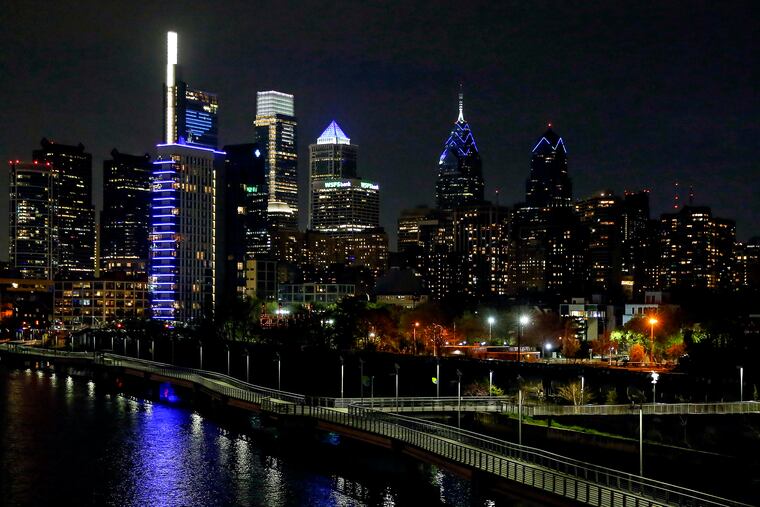The coronavirus crisis shines a light on the dark side of subcontracting
Even before the pandemic, labor experts and organizers have called the American economy’s move toward subcontracting a “race to the bottom,” in which workers get paid less and face more dangerous, precarious working conditions.

When essential city workers got time-and-a-half hazard pay for two weeks after the coronavirus pandemic hit Philadelphia, 500 prison health-care workers were left out.
At the University of Pennsylvania, 140 dining workers were told they’d be laid off at the end of March, while their counterparts at residential dining halls — direct employees of the university — were kept on with pay.
And when the Phillies and the Sixers set aside money for their hourly workers affected by the pandemic, almost 1,000 stadium workers weren’t eligible for any relief.
The one thing these workers have in common? They’re all subcontracted.
The coronavirus crisis has shined a light on how some workers are left out in the cold as more employers contract out services. Even before the pandemic, labor experts and organizers have called the American economy’s move toward subcontracting — whether that’s through temp agencies, contractors for services like catering or cleaning, or “two-tiered” workforces — a “race to the bottom,” in which workers get paid less and face more dangerous, precarious working conditions.
Even subcontracted emergency-room doctors aren’t immune to this, despite the current health crisis, as medical staffing firms cut doctors’ hours in response to falling hospital revenues.
» READ MORE: Tower Health to furlough at least 1,000 workers as COVID-19 wreaks havoc at hospitals
And as employers plan to reopen, experts say these conditions could become even more commonplace as companies under financial pressure turn to temp agencies to cut costs and stay flexible with their labor needs.
Lack of accountability
When District 1199c president Chris Woods slammed Mayor Jim Kenney for not extending hazard-pay benefits to his union’s members, who provide health care to inmates at Philadelphia jails, a city spokesperson said the union should look to Corizon Health for the money.
Corizon Health, which employs the health-care workers, holds one of the city’s biggest contracts.
The city’s response suggested it lacked any power in how Corizon pays its workers, which isn’t entirely accurate. The city can, and has, used its power as the lead business — the one who hires the contractor — to compel contractors to pay higher wages.
The city’s response is typical in subcontracting relationships — and can be dangerous for workers employed by temp agencies.
Although both the temp agency and the host employer are responsible for ensuring worker safety under the law, it’s often unclear who’s training workers, said Temple University law professor Jennifer Lee. Both parties tend to assume the other is doing so.
“There’s not the same sense of responsibility or obligation to temp workers as there is to permanent employees,” said Lee, who runs the Sheller Center for Social Justice and has studied temp workers.
This lack of accountability could have dire implications for temp workers employed during the pandemic. Will it be the host employer or the temp agency that ensures workers know about coronavirus risks and are following health guidelines on the job, like practicing social distancing and wearing personal protective equipment?
“That’s the million-dollar question,” Lee said.
These issues will likely affect even more workers as companies have turned to temp agencies to meet staffing demands in all kinds of businesses deemed essential during the crisis, from logistics to health care to grocery stores.
Essential temp workers have reported the same health and safety issues that other essential workers face, like a lack of protective equipment, hazard pay, and sick leave. There are also other dangerous conditions that are specific to temps, like being packed into a crowded van for a drive to a job site, said Dave DeSario, director of Temp Worker Justice, a national advocacy group that’s been surveying temp workers employed during the pandemic.
Unions and other labor groups have fought for subcontracted workers’ rights and seen some success in recent weeks.
Penn’s Student Labor Action Project organized a petition calling for the university to pay its subcontracted dining workers during the pandemic, and Penn ultimately agreed to pay the workers through the end of the semester. And 32BJ SEIU, a union that represents hundreds of laid-off subcontracted baggage handlers, wheelchair attendants, and cabin cleaners at the Philadelphia International Airport, fought to get $3 billion in the $58 billion federal airline industry bailout to be earmarked for airline contractors.
» READ MORE: Hundreds of workers at PHL are being laid off amid coronavirus outbreak
Still, 32BJ’s Pennsylvania director Gabe Morgan said that there would need to be accountability measures in place to make sure that money goes to workers.
The Philadelphia Inquirer is one of 21 news organizations producing Broke in Philly, a collaborative reporting project on solutions to poverty and the city’s push toward economic justice. See all of our reporting at brokeinphilly.org.